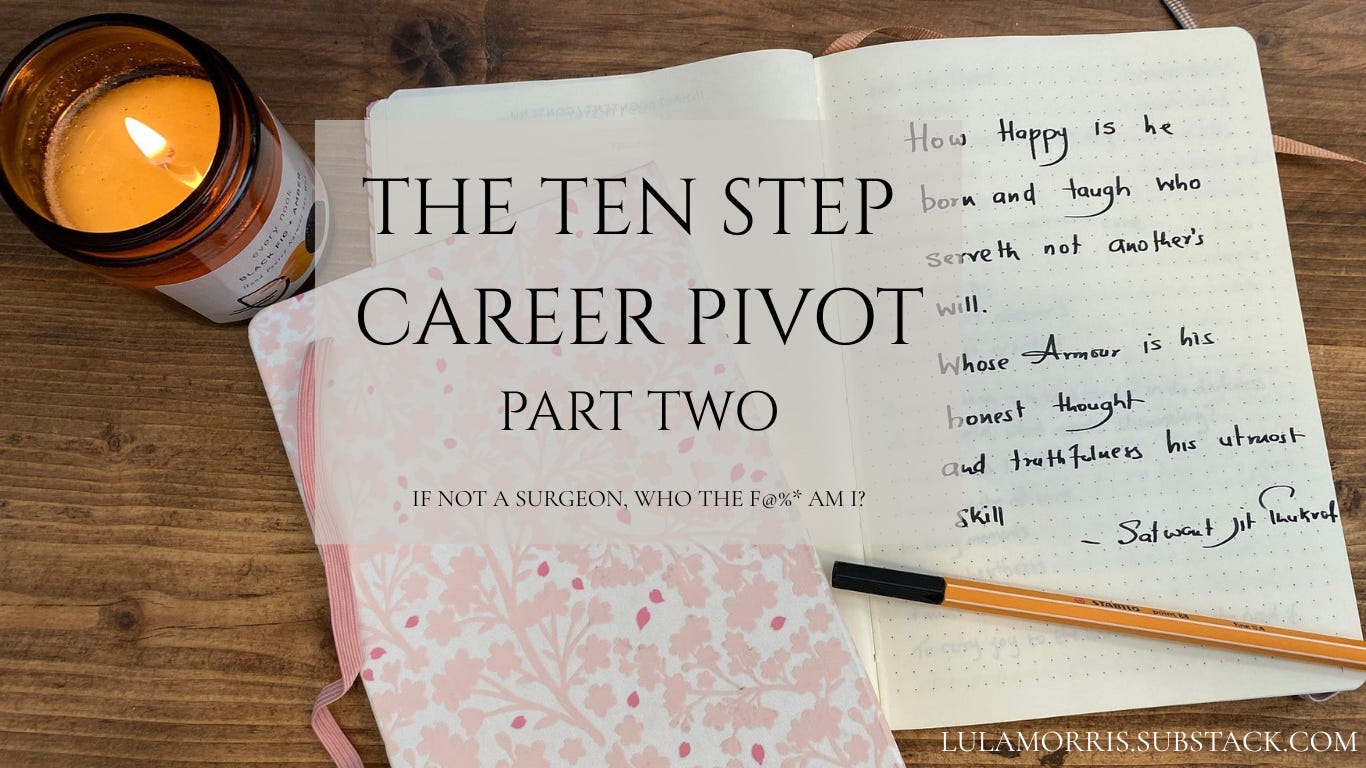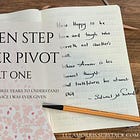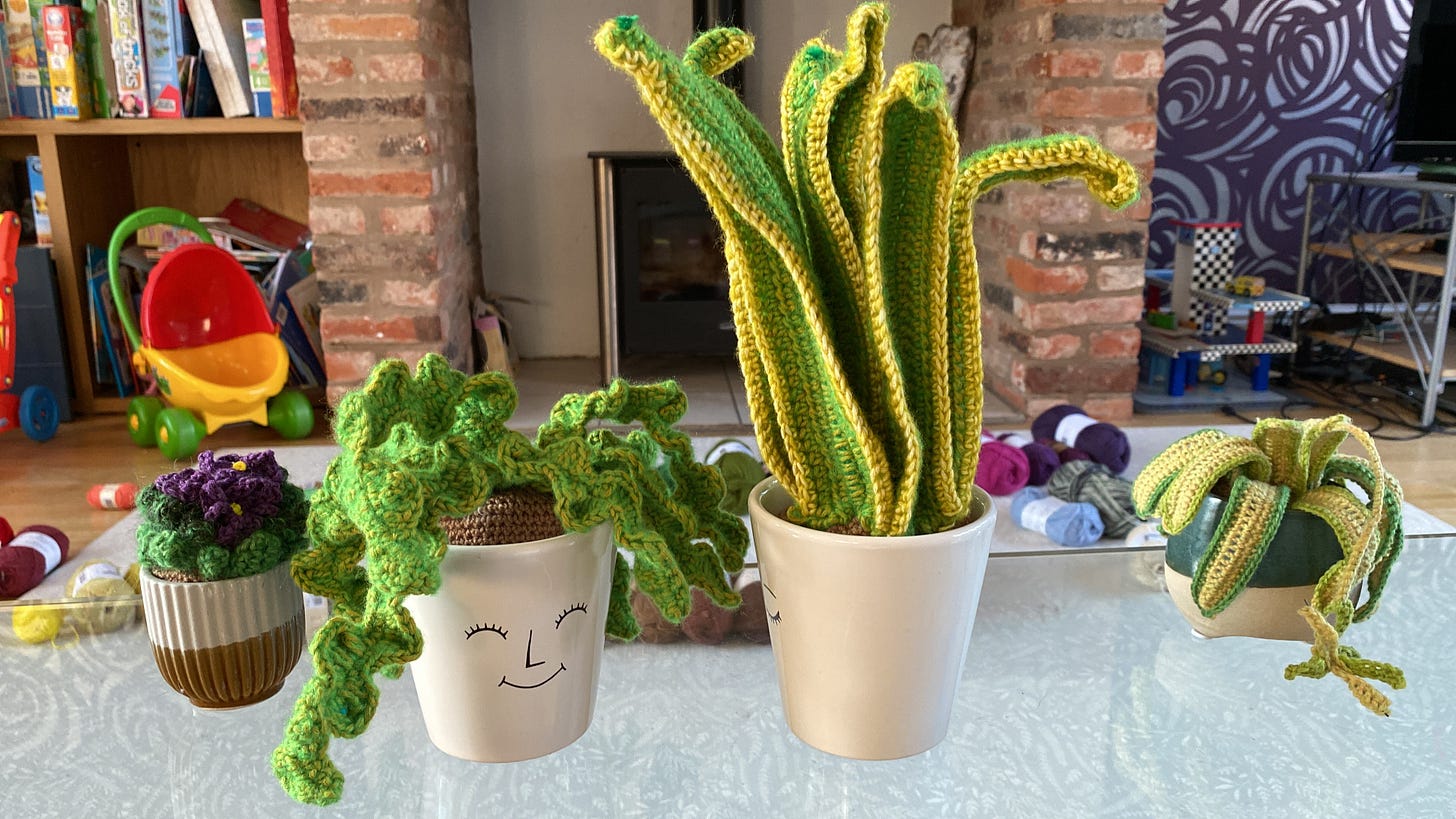In Part One of this essay series, I wrote about the first three steps of my career transformation.
In today’s socioeconomic climate, I know I’m not alone in re-evaluating my career priorities. While few may be tempted by quite as drastic a move as the one I’ve made, some might be interested to know how I finally found a way to move forward. The way, it turns out, is ten little steps.
The 10 Step Career Pivot - Part 1
So, if we sum up steps one to three as bringing focus to the preparation phase of transformation:
Step One - There is no rush
Step Two - Space to think
Step Three - Seek the right support
Then today, we’re digging deep and going back to basics with a big question, among the biggest questions of all. A question I’ve asked myself many times over the years. One that found its way into the poem I wrote for my very first post on Substack back in January, when I’d picked up a pen for the first time in years1. The poem which opened like this:
Putting down my scalpel,
and picking up my pen.
An empty page is waiting -
where to?
what next?
and then? -
to turn away
from eighteen years of
(literal)
blood
and sweat
and tears
(so many tears)
if not a surgeon, who the fuck am I? The full poem can be found here (with brand new audio recording):
Step Four: Who am I?
The feeling of identity loss that I experienced following my decision to leave medicine, articulated with profundity and profanity in Putting down my scalpel, is so common that psychologists have a word for it: enmeshment.
When our career becomes so entwined with our sense of self that major change such as redundancy, retirement or other job loss leaves us questioning who we are without our work, that is enmeshment.
Janna Koretz2 wrote in her article for Harvard Business Review of three main risk factors for this type of “existential crisis”:
A work culture that demands or rewards longer hours spent in work
The more time you spend doing something, the more central it becomes to identity
More time at work means less time spent on other activities or relationships thus still further reducing their balancing impact on our sense of self
In my own career, for the majority of my training I worked - on paper - 56 hours per week. In reality, it was much more, and a significant proportion of it during unsocial hours. Time outside work was then often spent writing research papers, completing audit projects, reading procedural texts for the next case or revising for exams, leaving precious little time for anything else. Birthdays, Christmases, friends’ weddings were all missed for the filling of the rota. Indeed, it was recently written into resident doctors’ contracts3 that annual leave requested for ‘major life events’ with at least six weeks’ notice should be accepted. Even since the addition of such a “WTF, why is this even necessary” clause, regular posts appear in online forums about doctors facing difficulty arranging swaps for their own weddings or planned paternity leaves.
A career perceived to be of high value by one’s family or community
Fear of failure to meet (real or imagined) expectations leads to such intense drive to achieve that our own wants, needs and identity become secondary to ‘success’
Though I was in no way pushed into medicine, such continuous drive to achieve is inherent in the way medical training is arranged. Fixed term contracts, endless portfolio-gathering, intense annual assessment panels, courses, exams, interviews, all being necessary to stay employed: doctors in training are constantly working towards the next challenge. Conversations such as ‘I just need to get a job, then we can think about starting a family’ are commonplace in doctors messes (where such facilities still exist, many having been removed to free up hospital space for other uses).
A career with a high enough salary that it elevates one’s socioeconomic class
The way we show up in the world and appear to others - our spending, what we wear, which restaurants we frequent - very often changes with a well paid job
Our identity becomes fused with the high paying career that opened new doors to us
I’ve written previously about my background and relationship with money, and how that changed as I followed a medical career path. Now nine months out of work, my adjustment from earning a six figure salary and being the ‘main breadwinner’ in our family to earning nothing has been significant, and my identity has certainly taken a lot of time and reflection to rediscover.
It is not difficult then, to appreciate why so many of us centre our identity on our career, though awareness of these risk factors can be instrumental in reframing how we manage our time and focus.
It is interesting, when I look to my Substack ‘bio’ line, written only a few weeks ago, that the first identifier I chose to include was ‘Former neonatal and trauma surgeon’. Not even my career, now, but the career I left nine months ago. Yet still I put that ahead of ‘mother’ and ‘writer’…
My key to relearning who I am underneath the labels of ‘doctor’ and ‘surgeon’ has been to go back to my core, to identify what matters to me: my values.
In Psychology Today, Tchiki Davis4 writes that a value is an “enduring belief upon which a person acts”. These can be linked to desirable behaviours, such as honesty or curiosity, or desirable end states such as health or wealth, and most people have a collation of both types that we use as our moral compass and the basis of our actions.
My core values are those that I try to instill in my children in our every day actions:
Kindness - to ourselves and love for others
Purpose - being curious about the world, people, books, and how we can grow, develop and serve others as we create and accomplish our goals
Fun - doing the things we love and finding joy in the moment
There are many other values that are important to me, I have a notebook page filled with a mind map of ‘me’, but I’ve found that keeping a short mental list of those that are central to who I am and how I want to interact with other people and the world helps to keep me grounded when so much about my life is shifting.
Self is a symbiosis of our experiences and our values. When identity is in crisis, returning to the core of what matters most to us can guide our actions as we rediscover who we are and how we choose to live.
And so, realigning with who I am is prerequisite for the next step in this transformation:
Step Five: What makes me happy?
After leaving my surgical career, I spent several months researching and applying for medical-adjacent employment in industries such as consulting, pharma and health tech. Given the current economy and jobs market, this was not the most uplifting of tasks. But it took around six months before I actually paused to ask myself ‘what do I actually want to do; what would make me happy?’. And honestly, for quite a lot longer, my answer was ‘I don’t really know’.
So I started to make lists:
Songs that make me want to dance
The best dopamine highs
Where do I go for a cosy warm glow
Things that I’ve achieved
Things I’ve always loved to do on a day off
Beautiful things
- see footnotes for the top of each of these lists, if you’re interested5
And I started to wonder if I could somehow create a career based around the things I love to do.
When I discovered the pleasure of writing as 2024 turned to 2025, a creative career began to feel… possible, if not yet realistic. I found a love for beautiful words and sounds, for poetic rhythm and wordplay, for the flow state when words fall from intangible recesses within the mind, or when I am captivated by the words of another. There is a unique joy in sharing words for no purpose other than their beauty, yet this thought led me to wonder:
What if it were possible to combine the things that make us happy, with our values and past experience to forge a foundation on which to build the ‘perfect’ career?
Which brings us to step six:
Step Six: What drives me?
With purpose as one of my core values, I’ve spent a lot of time considering what it is that my purpose might be. Having spent my entire adult life in service to the medical profession, the desire to ‘make a difference’ remains central to who I am. Though I will no longer be the surgeon performing life-saving surgery or directly caring for ill and injured children, in many ways my potential for effecting positive change in the world may be greater having stepped back from clinical practice. As a doctor, the majority of my work, important as it was, was at the individual level. The broadening of the visual field that occurs with a step backwards might just mean that impact is possible at system, or even societal level.
My work in paediatric surgery, and especially in paediatric trauma, brought me face to face with the devastating effects of the systematic social inequity that pervades, where despite promises of ‘levelling up’, cycles of deprivation roll on. Indeed, my own research6 found that violent injuries among children and young people are increasing, at the same time as local government funding of youth services is cut. Injuries in the home remain all too prevalent too. There is little I nor anyone else could do for a child crushed by a tipped over chest of drawers or falling from a tenth storey window, yet there are no statutory requirements for rental properties to have furniture secured nor for window limiters to be fitted in high rises.
Imagine the benefit, if rather than treating the aftermath of life-changing injury, I could utilise the knowledge I already have, to advocate for injury prevention initiatives nationwide…
This is of course, just one example. There are many other medical-related topics that ignite my passion, such as reducing the care-gaps experienced by 16- and 17-year-olds when accessing healthcare; improving the culture of surgical training, especially for women; how NHS staff wellbeing must be prioritised (and I don’t mean desk yoga7); and how shared learning initiatives can promote better cross-specialty working and enhance patient care.
To consider those drivers though that are most relevant outside of the specific context of health care; those which are the most highly transferable, the times when I have felt most fired up, most alive, have been those when I have been able to lift others. To perform a complex surgery is one thing. To instil in another the confidence that she has the technical capability and talent to safely and skilfully perform that procedure, and then to support her through it is another level of rewarding.
I have come to realise that I really do care about rebalancing leadership and amplifying the voices of those who are routinely talked over. Others may have louder, or deeper, or just more ‘male’ voices which suggest an authority often unquestioningly accepted simply by virtue of the confidence with which it is delivered. But it is vital that we all have the opportunity to be heard. Because often it is the quieter voice that offers a perspective that might just change the world.
I learned recently that the key to a sustainable, purposeful, joyful career, is to spend as much time as possible operating in our Zone of Genius. This moment of enlightening came courtesy of the incredible Elaine Welteroth in her MasterClass8 ‘Designing Your Career’.
Understanding what drives us - what we are truly passionate about, is one of four elements that must intersect to define our Zone of Genius. If we are passionate about our work, our potential is limitless. For energy is born from purpose.
In the final part of this essay series, next week, we’ll explore the Zone of Genius in more depth and complete steps seven to ten of this ‘Ten Step Career Pivot’.
A career mission statement
I don’t need another qualification
What can I expect from my career
Letting go
I very much hope to see you there.
Louise x
I know that many of you have been or are going through similar transformations, I’m so grateful for all the comments you’ve shared about your own experiences or observations about my essays. Please do feel welcome to continue the conversation, or even start one if we haven’t met before! If you haven’t yet signed up to my newsletter, I’d be delighted if you would consider subscribing - it’s free and it directly supports my writing as well as making sure you get first access to the next essay as soon as it’s released.
If you enjoyed this post, you might enjoy this one from last month - on one of the activities I’ve come to love in this time of ‘creative pause’ - a way to quiet overthinking:
To explore further, you might like to take a look at the index of my work here:
Ok, that’s a slight exaggeration. I have written birthday cards. And until 2023 I wrote a LOT of clinical and operation notes by hand, such that arriving at Alder Hey as a Consultant was quite the culture shock in many ways, but in particular as the entire patient record system is electronic, nobody carries a pen any more. But I haven’t written for pleasure…. well, ever. Until now.
Koretz, J. Harvard Business Review (2019) What Happens When Your Career Becomes Your Whole Identity
Dancing songs - currently Bruno Mars & Rose APT or Shakira Waka Waka(Africa) because my 4-going-on-17 year old daughter loves to sing and dance to them and her enthusiasm is infectious.
Dopamine high - short bursts of exercise, or making something such as a beautiful cupcake or a crochet plant
Cosy glow - hugs from my children or a walk in nature
Achievements - Fellowship of the Royal College of Surgeons (hardest exam I’ve ever done), publishing 19 papers in medical literature, 20 international conference presentations, and organising a DIY wedding with 163 guests
‘Day off’ activity - spa day with a good book, or hosting a group of friends for tea and cakes
Beauty - daffodils, or a Cornish coastal view
I love yoga - and I especially love yoga that I don’t have to get changed or move from my desk for (and if you do too, may I recommend the fabulous
’s Yoga for Tired People!) - I only object to desk yoga as an NHS wellbeing initiative when it is badged as inclusive for all staff yet the majority of clinical staff have neither a desk nor the 15-30 minutes required for the sessions put on in some trusts. It only serves to highlight the disconnect between the experiences of front line staff and the hospital’s administrators and leaders.Elaine Welteroth’s MasterClass trailer via YouTube and discussed in Vogue article










Such an excellent, excellent post Louise!!! So much to salute you for, (especially the crochet!) 😉and so much value to unpick. I have to go back and read again. I'm pleased you retired as a surgeon for all of your reasons you've highlighted but especially to share your YOU words here!
Your point about "enmeshment" is fascinating, and it got me thinking about the flip side of it. What if we embrace enmeshment, not as a trap, but as a temporary, immersive experience? Like a method actor diving deep into a role, we could fully inhabit a career, knowing that it's a chapter, not the whole book. This way, when it's time to pivot, we're not losing ourselves, but rather shedding a skin, ready to try on another. It's like saying, "I was a surgeon, and I was damn good at it, but that's one facet of me, not the whole gem." It takes the sting out of leaving and makes room for joyful exploration.